Content
- What is a Digital Marketing Strategy and Why is it Important to Have One?
- Digital Marketing Channel Strategies for eCommerce Online Stores
- Key Takeaways
Share This
The global shift towards e-commerce has accelerated with major retail brands like Forever 21 and Crabtree & Evelyn closing physical stores.
In Singapore, e-commerce revenue is expected to amount to $7.29 billion by the end of 2022. A study conducted by Visa found that 1 in 4 Singaporeans shop online at least twice a week, with the most frequent shoppers in the age group of between 25 to 44. This can be attributed to the rise in smartphone adoption and the increased confidence in mobile e-commerce.
As digital screen time grows and consumer trust in secure payment gateways rises, businesses must adopt robust e-commerce digital marketing strategies to connect with online shoppers.
A digital marketing strategy is a blueprint detailing the specific digital marketing channel tactics and action plans required to achieve the set objectives and key performance indicators for a business.
Parts of a digital marketing plan include:
Lacking a clear digital marketing strategy often leads to misaligned campaigns that fail to achieve objectives, akin to shooting in the dark.
It is easy to get carried away and launch trending marketing campaigns such as influencer marketing, video marketing, and programmatic advertising with little understanding of how these will impact return on investment. This often results in overspending of marketing budgets and underachieving set KPIs.
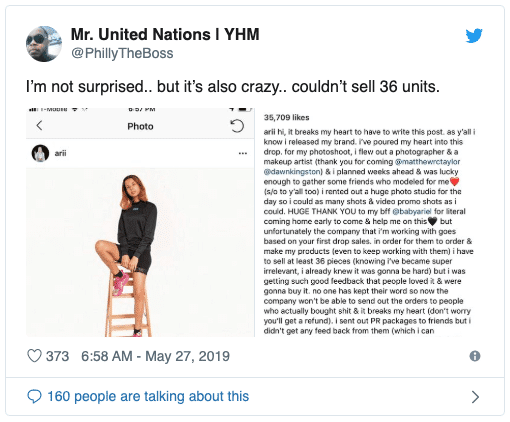
Take, for example, Instagrammer @Arii, who reportedly failed to sell 36 T-shirts to her huge fanbase of 2.6 million followers.
Before discussing the following digital marketing channel-specific strategies, it is paramount to first highlight the importance of having a robust e-commerce website.
Having a website that is effective in converting visitors into paying customers is one of the first steps eCommerce business owners should take note of if they want to see good returns on marketing spend.
A low-converting website can undermine even the best campaigns, particularly in high-cost, competitive markets where acquisition expenses are steep. If a website has a conversion rate of 1% (i.e., 1 in 100 visitors purchase $100), the cost of acquiring one visitor (CPA) cannot exceed $1.00 (i.e., $100 ÷ 100 visitors).
Doubling the conversion rate to 2% would enable an increase in CPA to $2.00. In competitive markets, it is common to expect a minimum cost per click of $1.50 to $2.00, which in this scenario is dangerously close to turning a marketing campaign unprofitable.
Chomel, a leading fashion and accessories retailer in Singapore, is a good example of a conversion-optimised eCommerce website.
The main navigation menu is well-organised into main product categories with drop-down menus for the sub-product categories, enabling the user to get a clear sense of all products offered at a glance.
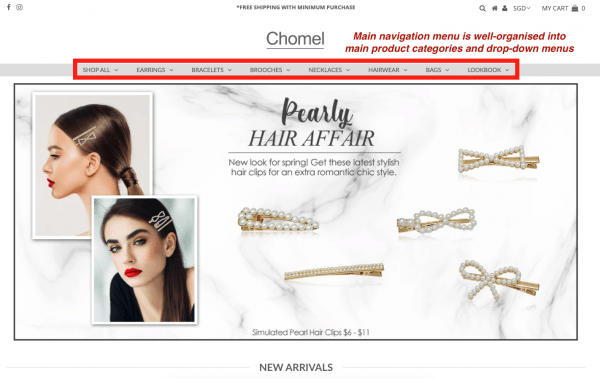
The shipping information and rates are transparent as well, clearly stating the shipping rates of DHL Express for orders above and below $100 – $150. Building trust and displaying transparency are important factors that drive conversions.
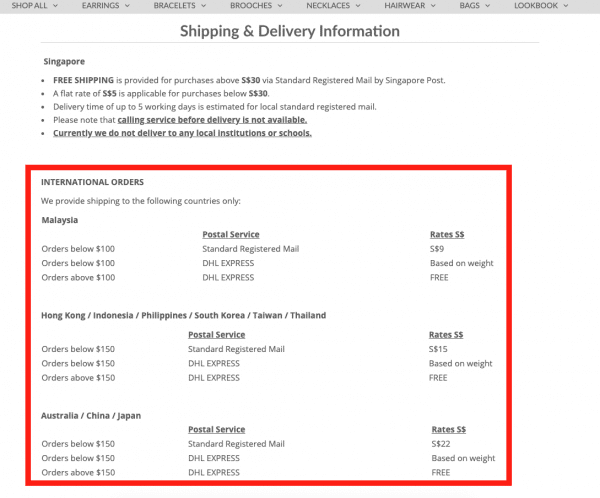
Items that have sold out are marked and made obvious to encourage a sense of urgency.
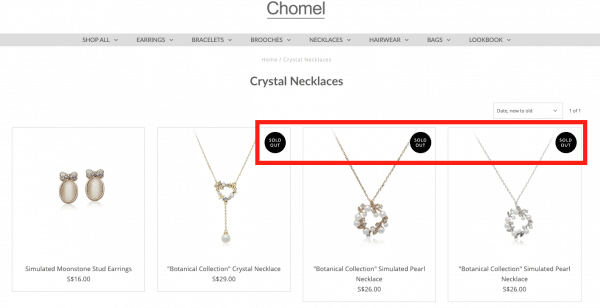
The checkout page includes a link to the refund policy, privacy policy, and terms of service pages. The site is also HTTPS secure to protect user data.
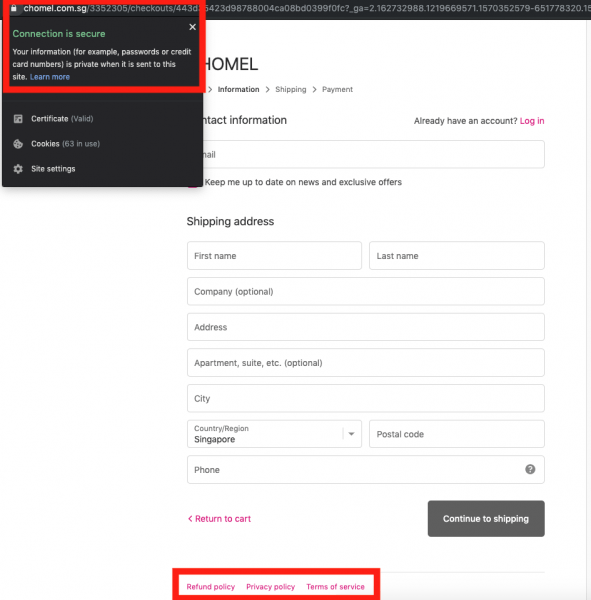
Once the website is optimised for conversions, only then should marketers implement the following digital marketing strategies.
Googling the search term “buy diamond ring online” brings up the paid and organic search engine results pages, with Bluenile.com ranking number one on the organic search results.
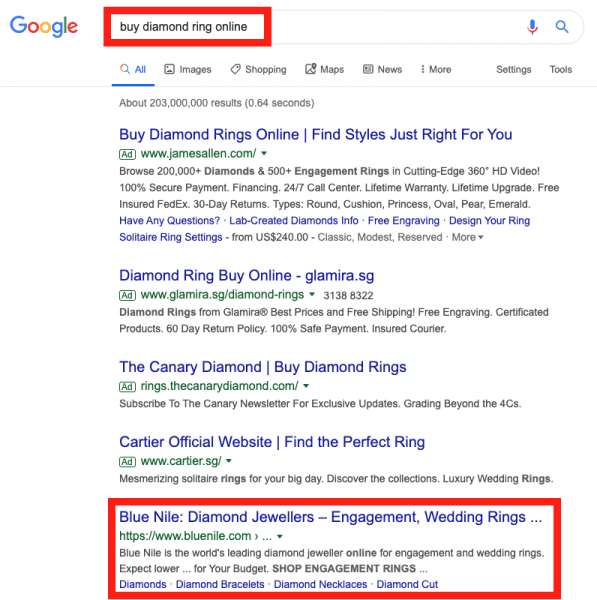
Organic search is one of the highest ROI channels of digital marketing, at 49% compared to paid search, email, and social media.
To rank on top of Google in the long term, an e-commerce website needs to have the following attributes:
Blue Nile has all its pages well optimised in terms of inserting its target keyword search terms into the <title> tags of the page. It is ranking well even for the search term “women’s diamond rings” as the <title> tag matches the search term.

Blue Nile has over 7000 different websites linking to it, according to the Ahrefs SEO tool.

Backlinks signal authority and trust to Google, playing a vital role in boosting a website’s visibility in search rankings.
eCommerce websites need to display trust signals such as refund policies, trust seals such as the BBB, contact details, transparency of shipping rates (no hidden charges), HTTPS, and many more to gain trust and rank well on Google.
For more information on E.E.A.T., check out Google’s Search Quality Evaluator Guidelines.
Some of the channels eCommerce online stores can start advertising on are:
To start advertising on paid search, the Google Display Network, and Google Shopping Ads, sign up for an account with Google Ads.

Paid search delivers fast results but requires careful budget control. However, marketers should watch their budgets as it can get very costly in competitive markets.
Using a free tool like Ubersuggest can provide an estimated cost of every click (CPC).

Based on the data provided, it can cost a whopping $8.19 just for a click on a paid search ad!
On the Google Display Network, however, it typically costs significantly less than paid search, at an estimate of $0.50 to $2.00 per click.

Marketers can launch various display ads targeting audiences at different buying phases. For example, if a website visitor left the site at the checkout page without purchasing the sapphire, Blue Nile can retarget the visitor with a display ad offering 20% off the purchase price using retargeting features within Google Ads.
Marketers can also target audiences who have recently been shopping for jewellery with Google Ads’ In-Market Audiences targeting selection.
Check out our Guide to Digital Advertising for a more in-depth exploration.
Marketers use social media to build brand awareness and customer engagement, while also promoting time-sensitive offers and campaigns.
Blue Nile uses Facebook, Instagram, and Pinterest to inspire followers, celebrate occasions and seasons, and promote their products.

Rather than just promoting rings after rings, Blue Nile’s Instagram feed is updated regularly with a variety of inspiring and beautifully taken photos, touching the emotions of their followers and at the same time portraying their jewellery in a romantic light.
Blue Nile also periodically launches Facebook Ads to advertise promotional discounts.

They respond to fan comments on Instagram, increasing user engagement.

Email marketing is an effective channel for nurturing leads, driving repeat purchases, and fostering brand loyalty.

Upon signing up for the Blue Nile’s newsletter, an automated email would automatically be sent to the recipient’s email address.

Email is a great (owned media) channel to invest in compared to social media (shared media), as the business has full control over the email list. Unlike social platforms like Facebook that limit organic reach to encourage ad spend, email marketing has been around for the longest time and is here to stay. Learn the ins and outs of email marketing here.
There is no one-size-fits-all strategy for every online store. The important takeaway is to always test different digital marketing channels and measure results, then optimise for the best returns.
An e-commerce website optimised for conversions is foundational to maximising returns from your digital marketing investment.
If you’re struggling with hiring an in-house web designer, you may want to outsource the project to established agencies that offer e-commerce web design services.
Check out the following agencies:
At Equinet Academy, we offer 6 core modules of Digital Marketing to prepare you for the implementation of digital strategies. By completing these 7 modules, you will then become a full-fledged Certified Digital Marketing Strategist. Find out more about the Certified Digital Marketing V2 (CDMS) Programme by completing the following:
Do also check out our array of digital marketing courses taught in person in Singapore or online.
Receive the latest blog articles right into your inbox.
Reader Interactions